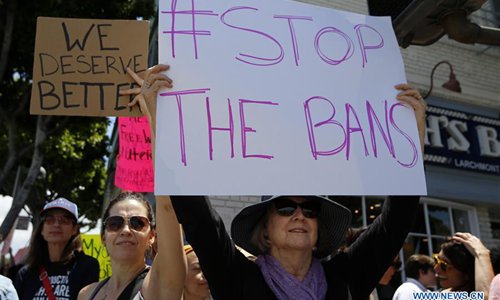Temporary injunction on controversial women’s rights restrictions
US judge blocks Texas abortion law

A man attends a rally in Los Angeles, the United States, on May 21, 2019. Dozens of rallies were held Tuesday in southern California's major cities to denounce the growing number of states passing restrictive abortion laws and demand women's rights in the contentious abortion issue. (Xinhua/Li Ying)
A US federal judge on Wednesday temporarily blocked a law that bans most abortions in Texas as part of a conservative drive to deny access to the procedure.
The statute, which went into force on September 1, prohibits abortions as soon as a heartbeat is detectable, usually at around six weeks of pregnancy, before many women even know they are pregnant. There are no exceptions for cases of incest or rape. US District Judge Robert Pitman in Austin granted the request from President Joe Biden's administration to block enforcement of the law pending further litigation, on grounds it violates the US constitution. Texas can appeal. In his 113-page ruling, Pitman said Texas officials had created an "unprecedented and aggressive scheme to deprive its citizens of a significant and well-established constitutional right."
"From the moment SB 8 went into effect, women have been unlawfully prevented from exercising control over their lives in ways that are protected by the Constitution," Pitman said, using the abbreviation for Senate Bill 8, the law's official name.
"This Court will not sanction one more day of this offensive deprivation of such an important right."
In recent years, similar laws have been passed in other states but were struck down because they violated US Supreme Court precedent from Roe v. Wade, the 1973 ruling that guaranteed a woman's right to an abortion until the fetus is viable outside the womb, at around 22 weeks of pregnancy.
The Texas law, which thus far is the most restrictive in the country, is unique in that it empowers anyone to file a lawsuit against a person who has assisted in an abortion. They can be rewarded with $10,000 for initiating cases that lead to prosecution, prompting charges that the law encourages Texans to act as vigilantes.
As Texas can still appeal Pitman's order, the case may end up in front of the Supreme Court.
The White House welcomed the ruling as "an important step forward toward restoring the constitutional rights of women across the state of Texas."
But the right to abortion remains under attack there and in other states, said spokeswoman Jen Psaki, so Biden supports codifying Roe v. Wade into law and "will continue to stand side-by-side with women across the country to protect their constitutional rights."
The nine-justice Supreme Court, with its clear conservative majority, cited procedural issues when it decided in September against intervening to block the Texas law, as pro-choice advocates had requested. It did not rule on the merits of the case.
The court had already agreed to review a restrictive Mississippi law that could also provide an opportunity to overturn Roe v. Wade.



